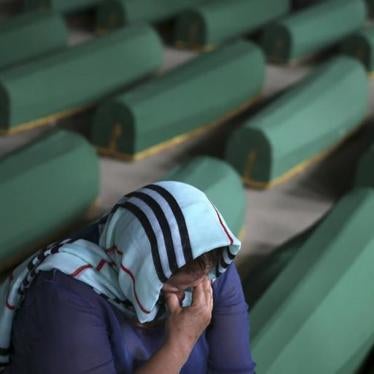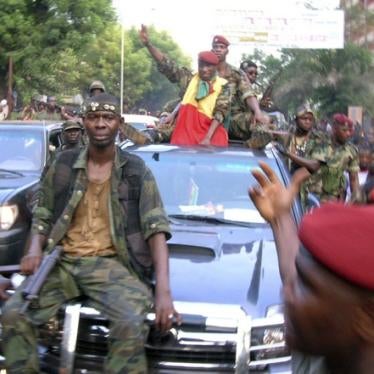July 17, International Justice Day, is a reminder both of how difficult it is to bring the people responsible for the world’s worst crimes to justice and of how crucially important it is not to give up.
Over the past two decades, trials for genocide, war crimes, and crimes against humanity have increasingly taken place before national and international courts. This is a dramatic shift, well worth celebrating. Yet, governments often still block justice for political reasons, or cast it aside in favor of competing considerations. Sudanese President Omar al-Bashir’s travel to South Africa in June without being arrested despite the International Criminal Court (ICC) warrant out for him for alleged atrocities in Darfur is one recent example.
For victims and activists on the front lines in many countries, the importance of sustained, concrete action by local, regional, and international officials to ensure fair, credible prosecutions for the worst crimes is clear. Below are just a few reasons drawn from Human Rights Watch work with victims and local partner organizations. To see why others think justice matters, also check out the International Criminal Court’s July 17 #JusticeMatters campaign.
For Chad, long-awaited justice for alleged war crimes, crimes against humanity, and torture by the former dictator Hissène Habré will become a reality when his trial opens in Senegal on July 20. On the importance of accountability, Souleymane Guengueng, who helped lead the two-decade effort by victims to bring Habré to trial, has said: “I would always tell people that as survivors of torture, with everything we went through, something is missing that only justice can heal. True psychological healing. For someone who hasn’t experienced prison, who hasn’t experienced torture, it’s impossible to understand.”
For the Democratic Republic of the Congo, the transfer of former rebel commander and army general Bosco Ntaganda to the ICC in 2013, seven years after the court first issued an arrest warrant for him, was a significant development. One activist said: “What gives me the most comfort is that you may think you are a warlord and are untouchable as you are called ‘The Terminator,’ but you should know that one day justice will triumph.” Ntaganda’s trial on war crimes and crimes against humanity in the country’s Ituri region in 2002 and 2003 is set to begin this September.
In 2014, a United Nations Commission of Inquiry on North Korea found that the violations —including mass starvation, executions, and forced labor—revealed a scale of abuses that were without parallel in the contemporary world. North Korean defector Sungju Lee told Human Rights Watch: “Justice can provide basic rights for people that have been suffering for three generations under the evil government. The dictatorial government has made them mute, deaf, and blind… As fellow human beings, we must fight for people in North Korea.”
In June, more than 100 groups from around the world called for accountability in the United States for torture and other government abuses since the September 2001 attacks: “Continued impunity is a dark chapter in the history of the United States that threatens to undermine the universally recognized prohibition against torture and other abusive treatment, and sends the dangerous message to U.S. and foreign officials that there will be no consequences for future abuses.”
In Guinea, victims are still seeking justice for the more than 150 massacres and dozens of rapes committed by security forces at a peaceful protest in a stadium on September 28, 2009. Activists told Human Rights Watch in 2012 that the lack of justice for previous abuses in the country fueled increasingly brutal crimes. Recent charges against high-level officials by local judges have raised hopes that cases will finally move ahead after nearly six years.
More than 100 groups from around the world called in May 2014 for justice for grave crimes committed by all sides in Syria to deter further abuses. Russia and China disregarded the plight of victims of Syrian government abuses by blocking a UN Security Council resolution that would have given the ICC a mandate in Syria. Abuses against civilians in Syria’s bloody armed conflict have led to a humanitarian crisis with millions of people internally displaced or seeking refuge in neighboring countries.
“Arrest the Lord’s Resistance Army because if they are not stopped, we will continue to suffer,” said one victim. The rebel group has been responsible for numerous atrocities in northern Uganda, the Democratic Republic of the Congo, and the Central African Republic. One of the group’s leaders, Dominic Ongwen, was surrendered to the ICC in January, a decade after the warrant for his arrest was issued, to face charges of war crimes and crimes against humanity committed in northern Uganda.
In May 2014, local and international groups called on Palestine to join the ICC “to ensure international justice for victims of war crimes and crimes against humanity committed on Palestinian territories, and [to] send an important message that such crimes cannot be committed with impunity.” Palestine officially became a member of the court in 2015 and the ICC prosecutor is examining the situation.
South Sudan activists interviewed in October 2014 said: “If you want to bring South Sudan to normalcy, you need accountability,” and “when you do not punish, [there are] cycles of violence.” After pervasive impunity for earlier human rights violations, activists are calling for justice for grave crimes committed during the country’s conflict that began in December 2013 and that has been characterized by ethnically targeted killing, looting, and other crimes.
Sierra Leone local activists have said that the UN-backed Special Court for Sierra Leone, which tried grave crimes committed during the conflict that ended in 2002 and which convicted former Liberian President Charles Taylor of war crimes and crimes against humanity, has helped show that no one is “above the law” and that “the law is powerful.”
Updated on July 27, 2015 to correct inaccurate date.










